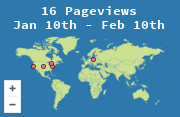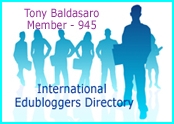The following is a collection of thoughts I am sharing with my Joint School Board next week:
-Will Richardson
- Reading is no longer a passive process. It is quickly evolving into an active, participatory and collaborative activity. With ubiquitous access resulting in the rampant amateurism of web publishing (which may not be a bad thing – see Clay Shirky’s article in the June 4th edition of the Wall Street Journal) literacy education needs to be more than just teaching our students how to “consume” information simply because not all information is ready for consumption. Our students need to be able to find, vet, assimilate, remix, create, and publish new information. They need to know the difference between “good” and “bad” information and they need to know how to use such information to challenge tired dogmas and create new constructs. In the words of Alvin Toffler, “The illiterate of the 21st century will not be those who cannot read and write, but those who cannot learn, unlearn and relearn.”
- Tools like iPods and iPads with their associated apps allow individuals to read collectively, collaboratively, and conceptualize what they read in multiple dimensions. To teach reading for the 21st century learner, we can no longer teach it as a solitary event. Many of our teachers understand this and as I leave the SAU, I hope that the respective boards continue to encourage participatory reading within their districts.
- As a parent of three children who attend schools within the SAU, I am most pleased that SAU school boards have passed the new Responsible Use Policy. Not only does its acceptance validate the expertise and hard work of the teachers who collaboratively wrote that policy, but it also provides immense opportunities for students to learn using these 21st century technologies.
- The teachers who engaged in the courageous conversations and worked hard to build expertise through Powerful Learning Practices (PLP) have the potential to shift teaching practices. While there is, understandably, some discomfort that comes with such shifts, it is widely recognized that students not only learn differently than they did a generation ago, but they also need skills that did not exist until relatively recently. The teachers involved with PLP now have the capacity to lead that shift. I hope that the SAU is able to capture and harness their collective expertise.
- My most proud moment as a member of this learning community was the day CMS was awarded the “EDie’s” Middle School of Excellence Award. Having now served on the “EDie’s” middle school visiting committee for two years, I more fully recognize the rigor behind the selection process, which only enhances my pride in being a part of the team that won that award in 2008. For me, it acknowledged the collective work associated with the transition from a “Jr. High School” to a “Middle School”. I recognize that all members of our community do not share my passion and beliefs associated with “Middle School”, but I can’t help but be grateful for an award that punctuated the efforts of the faculty and staff of CMS.
- I agree with Superintendent Morgan’s (and many others’) assertion that we need to challenge the status quo and find ways to personalize education, create experiences that foster the exploration of passions within our students, and support alternative methods to cultivate an educated citizenry. All too often the institution of school gets in the way of its purpose, or worse, the institution of school becomes its purpose. This SAU has had a history of doing just the opposite, creating institutions to meet its purpose, and for that it has the well-deserved reputation of being a forward-thinking, progressive school community. I hope – soon as a simply a parent and taxpayer – that this SAU continues to earn that reputation.
- My biggest regret over the past decade is my role in developing an over-reliance on standardized test data throughout the SAU. Having embraced the title of the “data guy” during my time at CMS and early in my time at the SAU, I am concerned that in doing so I may have inadvertently shifted the focus away from where it needs to be. I’m afraid that through my influence, standardized data has been used to narrow opportunities and create limitations. Learning, and school, is fundamentally very personal. Our students only have one opportunity to be a k-12 student, so by default it needs to be very personal for them. But, how personal is it to us as an institution? How do we step away from the easy assumptions made through standardized data and make infinitely more difficult yet meaningful constructs using the multiple qualitative measures that come from personalizing education? Further, there is a bigger standard that we need to be striving for; it is the performance of our students and graduates as collaborative members of society, a standard in which progress cannot be measured by standardized test scores. Instead, it is measured through the opportunities we create for students to grow, explore and achieve. Ultimately, our job as a learning community is to create foundations for our students, not ceilings. We do that by making learning very personal and by teaching students, not grade levels, not test items, and not subjects. We do that by allowing students the opportunity to learn, unlearn, and relearn. We do that by encouraging students to take risks, fail, reflect, and proceed. We do this by personalizing and customizing learning for every student so that they can engage in learning that is meaningful and worthwhile to them. We do this by understanding that the variables in education are time and resources, not expectations. We do this by not putting a stopwatch on learning, using standardized test scores to institutionalize the process, or trying to fit all students into a single system. Learning is a uniquely personal process and we need to ensure that learning and the systems we build to support learning are equally personal, and equally dynamic for every student who attends our schools.






Tony thanks for sharing this. Reflection is so important for real learning to occur; I plan to share this with our admin team today. It is sometimes hard to remember change is a process, and some of our best learning comes from the mistakes we make and from the self reflection that happens when we look back at what worked and what didn’t and ask ourselves “why?” Good lessons, and great post.
Pingback: The Only High Stakes Test | TransLeadership
Tony,
It is a challenge to be an educator and a parent when it comes to the keeping it all in perspective. I wish I could be less biased sometimes. The challenge we face with data is that we rely on someone else’s process sometimes and not focus on the local assessments. I wish our teachers would be more formative with their assessment and not so summative. How do we use the data to inform instruction? Check out the SAU 50 website for our Follow the Child Initiative when it comes to the personalization of education.
Chris
Pingback: It’s Elisabeth’s Turn… | TransLeadership